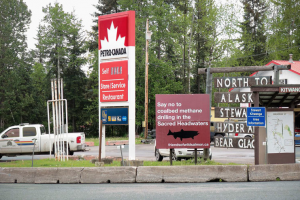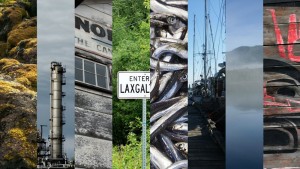'Mineral Matters' by Ruth Beer at the Kimura Gallery, Nov. 19-Dec. 12
by Michelle Saport |

Ruth Beer (in collaboration with Pascale Theoret-Grouix), Oil & Water, Still from HD video projection (2 minutes-looped), 2014 (Image courtesy of Ruth Beer)
Exhibit: "Mineral Matters" by Ruth Beer Show dates: Nov. 19-Dec. 12 Location: Kimura Gallery (Fine Arts Building, Second Floor) Gallery hours: Monday-Friday, 10 a.m.-5 p.m.; Saturday, 1-3 p.m. Information: (907) 786-1766
Opening: Wednesday, Nov. 19, 5:30-6:45 p.m. Kimura Gallery
Lectures: Monday, Nov. 24, 7:15 p.m. Fine Arts Building, Room 116
Wednesday, Nov. 26, 7:15 p.m.

Ruth Beer (in-collaboration-with-Soledad-Munoz. Fish,-copper, aluminum-and cotton jacquard weaving,-22"x-68" (2014).j (Image courtesy of Ruth Beer)
Fine Arts Building, Room 116
Thursday, Nov. 27, 1 p.m. Fine Arts Building, Room 330
Artist's statement: The works in the exhibition are inspired by debates concerning the socio-political, economic and environmental changes brought about by the rapid expansion of Canada's natural extraction industries and an ever-expanding network of oil and gas pipelines throughout Northern British Columbia. Both the unprecedented scale and potential consequences of these developments challenge a nuanced perspective of the issues at hand and offer a point of convergence for a timely dialogue about regional, national and global futures.
At a liminal moment in Canadian history, vast swaths of unceded indigenous territory-historically used as trading routes for oolichan oil ("grease trails")-are now proposed as transport corridors for millions of barrels of crude oil travelling from Alberta to the Northwest coast. As an increasing number of development proposals encroach upon this contested terrain, and as sustainable fisheries and cultural practices are put at risk by increased tanker traffic, it is in rural and remote regions where the impacts of changes to culture, water and land will be most directly felt. At once locally rooted and globally resonant, these developments highlight the complex and inescapable relations between human beings and nature.
As an artist engaged in creative practice-based research, my approach to the questions these developments raise is through representation, through art production both as a material and socially-engaged practice. The works in this exhibition, which include sculptures and weavings composed of copper, oil-based polyurethanes, aluminum and magnetic audio tape, and the videos and photographs stem from my interest in the discourses, experiences and future imaginaries emergent from the temporal and spatial change brought about by the exploitation of the region's environment. The artworks that aim to provoke thoughtful reflection and exchange are a component of "Trading Routes: Grease Trails, Oil Futures," an interdisciplinary, federally funded research and creation project that builds on past research and creation projects ("Catch + Release: Mapping Stories of Geographic and Cultural Transition") addressing cultural mapping and environmental transitions related to the fishing and canning industries of intercultural British Columbia coastal communities.
About the artist: Ruth Beer is an artist, researcher and teacher interested in cross-disciplinary approaches to creative practice. Her artwork includes sculpture, video, photography and interactive projections, and has been shown in national and international exhibitions. She is a member of the Royal Canadian Academy of the
Arts and has been awarded numerous public art commissions. Major federally funded Social Sciences and Humanities Research Council of Canada research and creation projects include her involvement as lead artist/researcher of "Trading Routes: Grease Trails, Oil Futures" (2013-17), a project promoting dialogue and exchange through the creative practices of indigenous and non-indigenous artists and storytellers. Trading Routes aims to address the complex cultural, economic and ecological changes brought about by the proposed construction of a multitude of crude-oil pipelines across the contested terrain of Canada's Pacific Northwest.
Ruth Beer is the assistant dean of research and a professor of visual art in the Faculty of Visual Art and Material Practice and the Audain School of Visual Art at Emily Carr University of Art and Design in Vancouver, Canada.
 "'Mineral Matters' by Ruth Beer at the Kimura Gallery, Nov. 19-Dec. 12" is licensed under a Creative Commons Attribution-NonCommercial 4.0 International License.
"'Mineral Matters' by Ruth Beer at the Kimura Gallery, Nov. 19-Dec. 12" is licensed under a Creative Commons Attribution-NonCommercial 4.0 International License.











